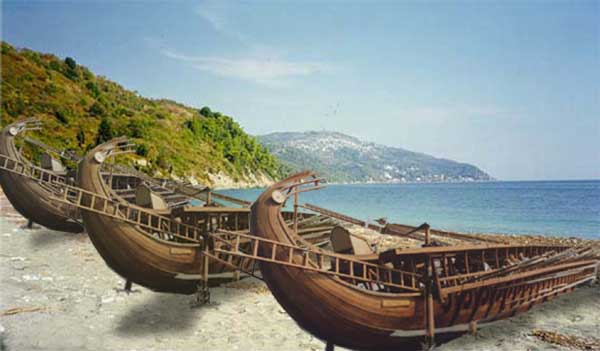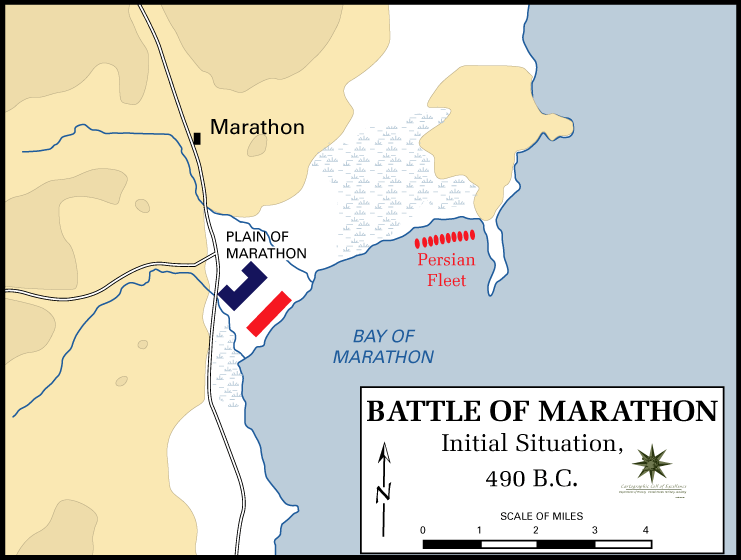‘With you it rests, Callimachus, either to bring Athens to slavery, or, by securing her freedom, to be remembered by all future generations. For never since the time that the Athenians became a people were they in so great a danger as now. If they bow their necks beneath the yoke of the Persians, the woes which they will have to suffer…are already determined. If, on the other hand, they fight and overcome, Athens may rise to be the very first city in Greece.’
– Greek General Miltiades

History contains hundreds of thousands of turning points, points where, if one little thing had gone differently, the entire course of human history probably would have been irreparably altered. Many of these points are battles, battles which decided who would be the reigning dominant culture that affected half the known world. The battle of Marathon in the year 490 BC was one such battle. It’s one of the earliest recorded battles in history, and if it had gone any differently, much of history as we know it today would be completely unrecognizable.
For a hundred years, the massive Persian Empire and the Greek city states had long been rivals for power in the know human world. King Darius I really didn’t like the Greeks, because they’d aided a revolt in Ionia against Persian rule. Once Darius reconquered Ionia, he set his sights on Athens and Sparta, the two largest city states, and began plans to subjugate Greece.
The Persians set sail for the port of Attica, near the city of Marathon. They were met by the Athenians, who were intent on blocking all entry into the city of Marathon. Their problem? They had only managed to amass half of the men Darius had. Darius had 20,000 infantry and cavalry on Greek soil. Athens had only 10,000. The Athenians called for Sparta’s aid, but Sparta refused, citing a religious festival… probably because they just really hated Athens and couldn’t see beyond the present moment to the logical outcome of their actions.
Well, that didn’t deter the Athenian men. They were absolutely determined to hold Greek soil and keep their lands away from the overreaching arm of the Persian Empire. Miltiades, the Athenian general, knew they could not hope to face the Persian cavalry. It would be mass suicide to even try. So, he moved his troops into an area surrounded by marshes and mountains, where the Persian cavalry could not join their main army.
The two armies, one huge, the other only half its size, amassed on the plain of Marathon. The Greek general roused his men with a plea for boldness, and then ordered his hoplites to form a line that matched the Persian line in length man for man. Then, in what his enemies would call a fit of absolute insanity, he told his Greek men to charge.
What they didn’t know was that he had reinforced his flanks.

The two lines clashed together, spears winking in the sunlight, blood spilling onto the ground, the sound of metal on metal ringing throughout the plain of Marathon. If the Greeks lost here, they’d probably lose all of Greece. They simply couldn’t afford not to win, and they knew it.
In seconds, however, in the ensuing melee, the middle of the Greek line began to give. It was too thinly stretched to hold out against the masses of the Persian army. That was exactly what Miltiades wanted. When the Greek line gave out, the Persian soldiers moved in, and the Athenians’ reinforced flanks engulfed them.
It was a bloodbath. The remaining Persian soldiers who weren’t surrounded tried to escape to their ships, but were routed. An estimated 6,400 Persians were slaughtered that day, and they had only managed to kill 192 Greeks.
The victory rang all throughout the Greek city states. The great war machine of Persia could be defeated, and they didn’t even need Sparta to do it. The Battle of Marathon acted as a watershed in the Greco-Persian wars. From it flowed triumph after triumph. It raised the Greek morale, reinforcing them to fight against impossible odds and beat back the ensuing Persian assault. Because of it, the following two hundred years looked down on the rise of Classical Greek civilization, which has been the basis for most of Western Civilization in the ages to come. Had the Persians won that day, they probably would have went on to wipe out the Greek city states one by one, and our world would look very different.